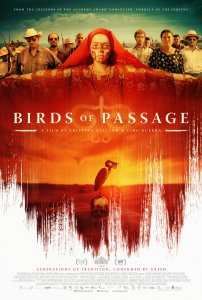
Review: Birds of Passage
The new Colombian film Birds of Passage (Pájaros de verano) seeks to offer a fresh spin on the era-spanning crime epic, by showing us an aspect we’ve never seen before. Based on interviews that filmmakers Cristina Gallego and Ciro Guerra (Embrace of the Serpent) held with the indigenous Wayuu people of Northern Colombia, the film dramatizes how the marijuana trade corrupted their people and culture.
Inevitably, whenever the film focuses upon the unique aspects of the Wayuu — their rituals, their moral code — it is indeed eye-opening. But too often the film relies on tropes from the crime epic handbook that flattens its characters and turns them into more of the same.
Spanning the late ’60s to the early ’80s, the film begins with an attempted courtship. Rapayet (José Acosta) is an ambitious young man who sees a future beyond the confines of Wayuu culture (the tribe is intentionally self-sufficient and strives to avoid contact with outsiders, or “alijunas.”) In an impressive ceremony that opens the film — kind of an indigenous version of a debutante coming-out ball — Rapayet dances and declares his intentions to marry the teenaged Zaida (Natalia Reyes, who will be in the new Terminator film). Zaida’s mother Úrsula (Carmiña Martínez) is cut from the same cloth as Livia Soprano, so she stubbornly refuses to allow her highborn daughter to be married to someone who deals with alijunas. She sets an exorbitant price for her daughter’s dowry that she knows Rapayet can never meet.
Except there’s marijuana. When Rapayet discovers that there are white Americans snooping around, looking for grass, he sees an opportunity. He contacts a cousin with a giant plantation, and they work out a deal to start producing that green stuff for export. The Americans compensate Rapayet handsomely and he is able to meet the dowry demands. Úrsula begrudgingly allows Rapayet to marry Zaida. All’s well that ends well, right? Yeah, right.
The rise and fall of a marijuana kingpin
 Rapayet is too mild-mannered to become an indigenous Scarface, but predictably marijuana becomes too popular a product to remain under control. And soon everyone involved is consumed by greed and a desire for more control.
Rapayet is too mild-mannered to become an indigenous Scarface, but predictably marijuana becomes too popular a product to remain under control. And soon everyone involved is consumed by greed and a desire for more control.
To help anthropomorphize the bad influence of the outsiders upon the Wayuu, Rapayet has a loose-cannon alijuna best friend, Moisés (Jhon Narváez), who is essentially the love child of Eric Roberts in The Pope of Greenwich Village, Robert De Niro in Mean Streets, and any other cocksure, bone-headed best friends we’ve seen in a dozen other crime movies.
Moisés is the first character to start shooting, but he is far from the last. Soon, generations of Wayuu traditions are sacrificed in the name of, you guessed it, money and power. Rapayet and Zaida (oh, did you forget about her? the movie kinda did too) move into a desert fortress, to keep their family safe. Spoiler alert: it doesn’t work.
On a visual level, Birds of Paradise is breathtaking. Many images and sequences are indelible on their own. The performances — especially Carmiña Martínez as the monolithic matriarch — are all quite good too. It’s just the machinations of the plot, with their predictable familiarity, that keeps the film from truly soaring.
Birds of Passage opens in New York today; in LA on Friday, Feb. 15. It platforms to select cities afterward.

More Pop Culture Beast – Movies on Video:
*Summer 1993
*Won’t You Be My Neighbor?
*Three Identical Strangers
Justin Remer makes movies, directs music videos, and plays in the bands Duck the Piano Wire and Elastic No-No Band when he is not writing movie reviews. His folk-rock documentary MAKING LOVERS & DOLLARS is currently streaming on Amazon.

